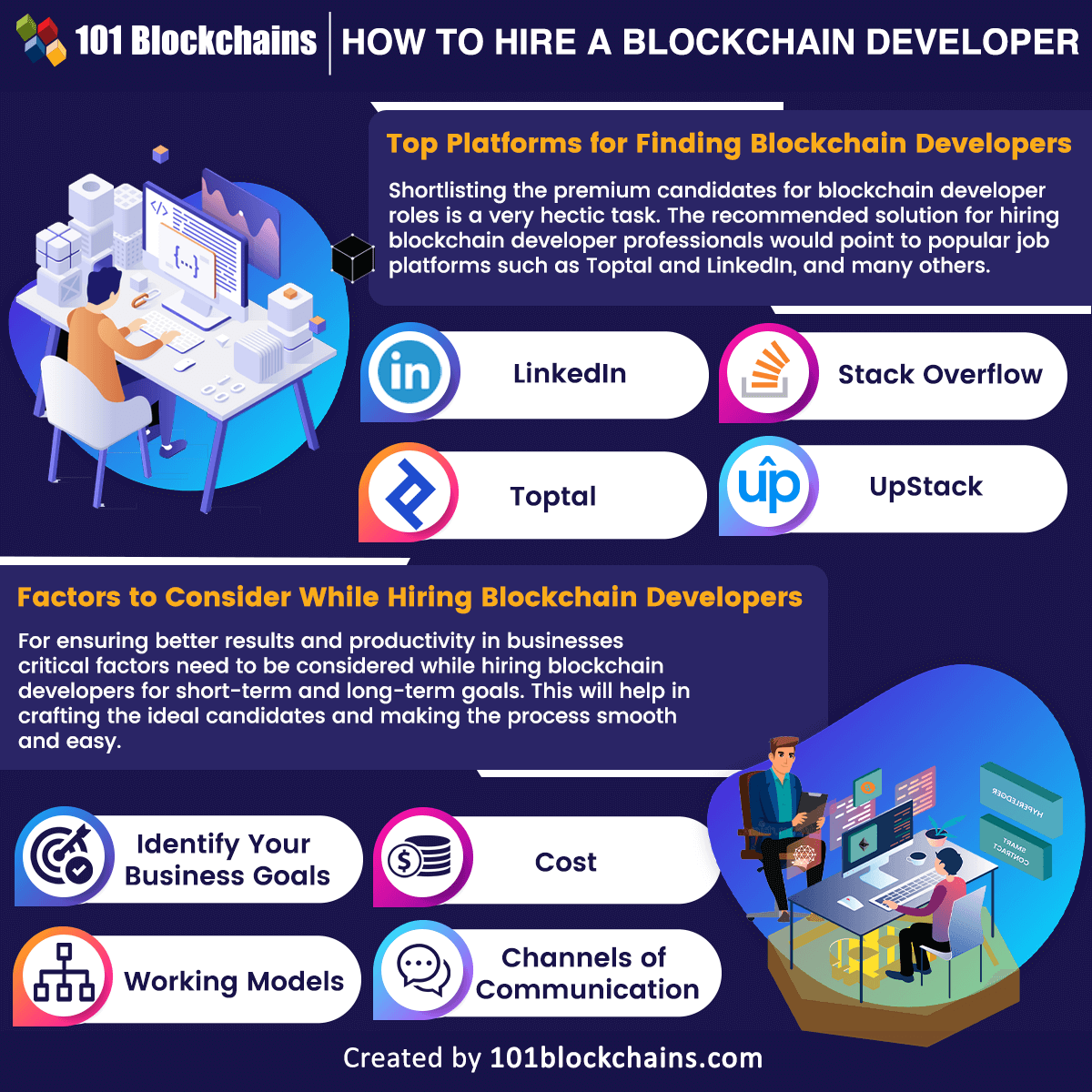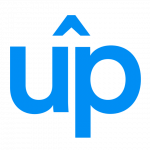Hire Blockchain Developers for Your Business

The transition of businesses to the domain of web3 has been one of the prominent trends in the world of technology. Businesses want the benefits of blockchain, such as immutability, decentralization, and transparency. At the same time, the need for competent professionals with an in-depth understanding of blockchain is gradually becoming more significant. Interestingly, organizations must hire blockchain developers to create their own blockchain-based apps or networks.
So, what are the possible ways to hire such developers? Do you want to hire developers for your business on an in-house basis or as freelancers? You have to answer many other queries before you round up on top-notch developers for the job. The following discussion will help you find an ideal guide for hiring blockchain developers.
Build your identity as a certified blockchain expert with 101 Blockchains Blockchain Certifications designed to provide enhanced career prospects.
Demand for Blockchain Developers
Before you start seeking blockchain developer jobs, you must have some questions about the popularity of blockchain developers. Since many organizations are adopting blockchain technology in different forms, it is inevitable to expect the need for blockchain developers. On the other hand, the blockchain workforce has not been able to maintain pace with the constantly growing market.
Even if the number of blockchain developers has been growing steadily over time, it has not been successful in covering the demand for blockchain professionals. The blockchain market may grow up to almost $69 billion by 2030, with formidable advancements expected in the fintech market.
Blockchain-based financial solutions, particularly in the domain of DeFi, would drive favorable demand across multiple industries. Entertainment, retail, insurance, aviation, and manufacturing will be some of the biggest industries leading the way forward in blockchain adoption. The scarcity of professionals with blockchain developer skills would obviously drive favorable career opportunities for people with fluency in blockchain concepts.
The demand for blockchain developers does not rely specifically on implementing new technology. On the contrary, blockchain has the potential to transform the modern economy, financial markets, banking, and other areas. Blockchain adoption could help businesses in coping up with emerging changes.
According to Deloitte, a 2021 survey suggested that businesses look up to blockchain technology as a strategic priority. Many experts have suggested that businesses will leverage blockchain in some form by 2025. The expected blockchain developer salary estimate would continue rising as more companies want to harness the capabilities of blockchain. Here are the notable advantages of using blockchain for businesses.
- Cost reduction.
- Improved trust, transparency, and anonymity.
- Immunity to fraud and tampering.
Blockchain technology has delivered plausible improvements in security, speed, efficiency, privacy, and reliability. It has helped in developing trust, a prominent problem in centralized systems.
Want to learn and understand the scope and purpose of DeFi? Enroll Now in Introduction to DeFi- Decentralized Finance Course
What is a Blockchain Developer?
The influence of blockchain on businesses showcases that blockchain developers have favorable career opportunities. New blockchain-based startups are growing, with web3 hubs increasing in number all over the world. The worldwide cryptocurrency market could extend beyond the $7 trillion mark by 2025. Therefore, it is important to wonder about ‘what does a blockchain developer do‘ to find out why they deserve so much popularity.
Companies seek blockchain developers to build and maintain new blockchain systems or applications. Professional blockchain developers could use blockchain technology to address business objectives alongside resolving end-user concerns. Blockchain developers must also have significant levels of expertise in smart contracts, which are important for defining the logic of blockchain-based applications.
The two specific types of blockchain developers include core developers and software developers. Core developers are responsible for designing and supervising the operations of the architecture and underlying blockchain systems. They are specialists who could work on developing protocols and building security systems alongside maintaining the operations of the network. Software developers in blockchain develop blockchain-based apps, which serve the utilities of existing platforms and applications. The outline of general blockchain developer skills could help you understand how developers could work on the new technology with ease.
- In-depth knowledge of blockchain technology and fundamental concepts.
- Fluency in one of the popular high-level programming languages.
- Expertise in smart contract programming.
- Detailed knowledge regarding cyber security and cryptography.
- Experience in utilizing P2P networking architectures and distributed systems.
Roles and Responsibilities of Blockchain Developers
The outline of responsibilities for blockchain developers could showcase what you can expect from a blockchain developer. It is important to know that the blockchain landscape is diverse, and you can develop multiple solutions. According to the selected technology and blockchain platform, you need to choose a developer with the relevant skills. Here is an outline of the different types of roles you can think of for a blockchain programmer or engineer.
Solidity developers are blockchain professionals fluent in a Solidity programming language, the preferred alternative for creating blockchain solutions. Companies can open listings for blockchain developer jobs in the role of Solidity developer. Solidity can be helpful for launching projects with EVM-compatible blockchain networks, such as Ethereum, Polygon or Binance Smart Chain.
The outline of roles of a blockchain developer would also include references to Ethereum developer jobs. Ethereum is one of the most trusted blockchain networks for developing decentralized applications. If you want to capitalize on the dApps ecosystem on Ethereum, you would need developers with practical Ethereum expertise and fluency in Solidity.
Another common possibility for ensuring good returns on your investment in blockchain developer salary would be to look for Rust developers. Rust programming language is one of the most efficient and secure alternatives for blockchain developers right now. Businesses that plan on creating their blockchain-based project on Polkadot, NEAR protocol, and Solana could rely on Rust programmers.
Some of the other types of blockchain developers you can look up to right now would include the ones focused on new solutions. For example, you would find blockchain developer roles such as NFT developer, DeFi developer, and play-to-earn game developer. DeFi developers work on decentralized finance protocols such as decentralized exchanges (DEXs), liquidity pools, liquidity protocols, staking solutions, and farming pools. On the other hand, you can choose an NFT developer for their skills and knowledge of ERC-721 and ERC-1155 token standards. Blockchain game developers can be favorable choices in case of projects working on play-to-earn games.
Aspiring to Become a Certified NFT Expert? Enroll in Certified NFT Professional (CNFTP) Course Now!
What Could a Blockchain Developer Create for Businesses?
The different roles and responsibilities of blockchain developers in different projects show the variety you can expect from blockchain programmers. What could a business have to do with a blockchain developer? Here are the important things businesses can create with the help of blockchain developers.
One of the interesting answers to ‘what does a blockchain developer do‘ would point to the selection of blockchain bridges. Developers could create bridges as the connecting link between blockchain networks with the support for cross-chain data transfers and transactions. Bridges could help in driving interactions among blockchain projects through the resolution of compatibility errors.
The next promising suggestion among the possibilities to hire blockchain developer would refer to the creation of decentralized exchanges. DEXs are one of the most significant non-custodial and peer-to-peer crypto exchanges, which help users with crypto transactions without intermediaries.
Crypto wallets are an integral component in the blockchain and crypto landscape. Do you want to create a new and unique crypto wallet application with distinct features? Then, you need a blockchain developer to develop an app that can help users in storing and managing crypto assets.
The variety of blockchain developer skills could also point to the possibility of using them in the development of NFT marketplaces. Non-fungible tokens are a promising new digital asset class, and new NFT projects could fetch millions of dollars. Businesses could also seek blockchain developers to create an NFT marketplace to capitalize on the hype for NFT technology.
Blockchain developers could also help businesses explore new prospects for growth in the blockchain gaming market. Play-to-earn games are the new highlight of the world of digital gaming, and companies could gain an edge in the blockchain market with innovative ideas. For example, Axie Infinity has been one of the most prominent entries among play-to-earn games, which has encouraged many others to follow suit.
Want to get an in-depth understanding of non-fungible tokens (NFTs)? Become a member and get free access to NFT Fundamentals Course.
Top Platforms for Finding Blockchain Developers
The concerns regarding ‘what does a blockchain developer do‘ might have found reliable solutions with the various possibilities. At the same time, it is also important to know about the steps you must follow in choosing a blockchain development. Apparently, you should try focusing on the platforms for hiring the services of developers. The recommended solution in such cases would point to job platforms, such as Toptal and LinkedIn, and many others.
On the other hand, you can seek platforms that focus particularly on developers, such as Stack Overflow and UpStack. However, it is important to shortlist the candidates who are eligible for the work of blockchain developers before finalizing them for a project. Here are some of the popular platforms you can rely on for finding professional blockchain developers.


One of the most trusted and popular professional networks you can rely on right now is LinkedIn. It has been popular for almost two decades as a network for professionals worldwide, with around 875 million users. LinkedIn is a viable platform for identifying blockchain developers hourly rate and the professional as well as academic qualifications of blockchain developers. The profiles on LinkedIn could also offer information about the availability of members for job offers. Businesses can post their desired job listing on LinkedIn, and candidates can apply for the job directly from the app.

The second entry among popular platforms for hiring blockchain developers includes Stack Overflow. It is more like a Q&A platform for software engineers and has around 100 million visitors every month. Users could rely on Stack Overflow for tech-related questions and answers, with more than 21 million questions already evident on the platform. Businesses could place their brand at the top with access to top talent through job listings.

Any business which wants to hire a blockchain developer must also look up to Toptal, a global remote company for connecting companies with tech professionals. It offers a marketplace for businesses to connect with popular engineers and developers. In addition, it also offers dedicated professionals for choosing developers who could match the individual requirements of companies.

The popular additions among the platforms to post blockchain developer jobs would also include UpStack. It is an online platform for connecting freelance developers and startups. Engineers could use online tools for conducting remote work alongside communicating with peers. Most important of all, UpStack also offers opportunities for encouraging flexible and competitive working structures, thereby drawing in more professional developers.
Start learning Blockchain with Worlds first Blockchain Skill Paths with quality resources tailored by industry experts Now!
Important Factors to Consider While Hiring Blockchain Developers
The accessibility of platforms for hiring blockchain developers would also emphasize certain critical factors for ensuring better results. Will the jobs on professional networking platforms and freelance platforms be enough to choose blockchain development? You must focus on the following factors to ensure that you choose the right blockchain developer.
-
Identify Your Business Goals
One of the foremost concerns of businesses about hiring a blockchain developer would generally focus on the cost. While the blockchain developer hourly rate or fixed salary models can be difficult to differentiate, you can make an informed choice with access to the right information. Therefore, businesses need to establish a clear outline of short-term and long-term goals for choosing blockchain developers.
What do you plan on achieving in the short term? Probably the selection of a blockchain network to work on. At the same time, you need to set long-term objectives such as the development of a private blockchain developer. The clear identification of objectives for the role of blockchain developers would help businesses establish the ideal impression of what they want developers to do.
The estimate for blockchain developer salary would also account for one of the notable factors businesses must consider before choosing blockchain developers. You need to understand the skill gap and establish the necessity for investing a high salary amount of up to $150,000 in professional developers. At the same time, the cost estimate should be developed on the basis of clear company objectives. In addition, it is also important to identify the type of candidate you want for distinct roles alongside crafting the ideal interview process.
Curious to learn about blockchain implementation and strategy for managing your blockchain projects? Enroll Now in Blockchain Technology – Implementation And Strategy Course!
How do you want blockchain developers to work for you? Most blockchain developers seek opportunities for remote work. However, it is important to define suitable models of engagement to ensure that they deliver the required output. Apart from the cost concerns, it is also important to establish specific needs about the role of blockchain for an organization. Therefore, it is important to identify the time zones and explore viable prospects for consistency in communication. You might want to stay away from the risks of hiring developers from completely opposite time zone, as it could affect productivity.
-
Channels of Communication
Businesses should also seek prospects to hire blockchain developers only after establishing the ideal channels for communication. Clear and effective communication among team members could help companies from avoiding significant errors in the operations of blockchain business.
It is important to note that culture could define how effectively developers can communicate with business leaders and other team members. Therefore, it is not only important to hire blockchain developers according to your requirements but also to help them onboard the company’s culture. Businesses must ensure that cultural differences should never influence communication channels by enabling seamless accessibility among teams.
Interview Questions You Must Ask
The popular entries among considerations for choosing blockchain developers would also draw attention to the interview questions you must ask. Businesses should know that the blockchain developer’s hourly rate is valid and delivers the desired return on their investments. Interview questions are a reliable instrument for figuring out the capabilities of a candidate for the job of a blockchain developer. In addition, the interactions during an interview could help employers find out whether a candidate has the necessary soft skills required of a blockchain developer. Some of the important questions you should ask candidates for blockchain developer roles include the following,
- What are the basics of blockchain technology?
- How does a blockchain network identify transaction validity?
- Which is the top platform for creating dApps and why?
- Is it possible to modify the data about transactions on a block?
- Do you know any high-level programming languages?
- What are the essential requirements for creating a dApp?
Start your Blockchain Developer Learning Path today and become a Blockchain Developer!
Final Words
The outline of blockchain developer interview questions might present the role of the developer as an easy one to pursue. However, you would have to understand that choosing a blockchain developer requires multiple considerations. The opportunity for blockchain developers has been increasing consistently with the introduction of many popular blockchain-based solutions.
Businesses would want to capitalize on the benefits of blockchain, and professional developers could serve desired value advantages. While the cost of hiring blockchain developers can be a bit high, the investment can help in achieving many prominent benefits. At the same time, careful selection of blockchain developers could help in avoiding possible setbacks. Learn more about blockchain development and how you can identify a competent blockchain developer with the ideal credentials.

*Disclaimer: The article should not be taken as, and is not intended to provide any investment advice. Claims made in this article do not constitute investment advice and should not be taken as such. 101 Blockchains shall not be responsible for any loss sustained by any person who relies on this article. Do your own research!
This article was originally reported on 101 Blockchains.


